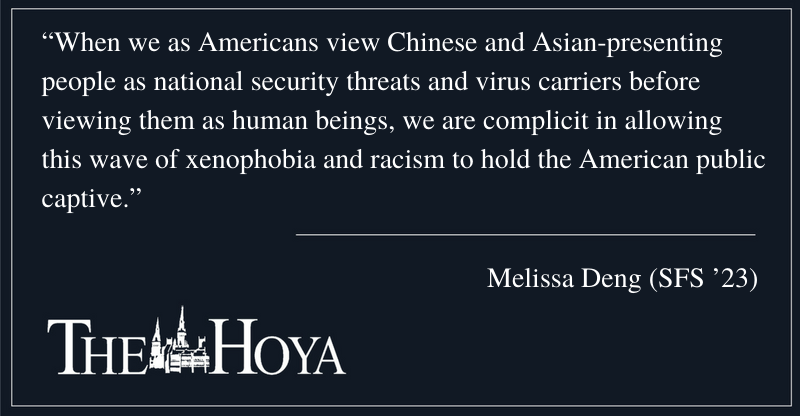Everyday life in China is coming to a standstill; streets once filled with people are now practically empty. During Chinese New Year, celebration was muted, with many family reunions curtailed by travel restrictions imposed to stop the spread of the 2019-nCoV coronavirus. In Wuhan, the source of this new strain of coronavirus, highways have been blocked off, and people are now prohibited from driving their own cars to prevent further spread of the virus, which has infected more than 24,000 people worldwide and killed over 480 people in China as of Feb. 5.
The severity of the situation in China cannot be understated; lives have been disrupted, and the virus’s effects on Chinese society are certainly palpable. Yet some of the loudest voices in the coverage of coronavirus have come from the United States, where only 11 people have been diagnosed with the virus.
Whether on social media or in an auditorium lecture class, it’s hard to ignore the agitated whispers blaming Chinese people for the mass destruction of human life that coronavirus will supposedly cause. Hearing all this chatter may lead one to believe that coronavirus is an imminent threat to Americans, but the virus has a substantially smaller effect on the United States than on China. By sensationalizing coronavirus and overstating its effects on the American public, we risk dehumanizing those in China and furthering a racist and xenophobic narrative toward Chinese and other Asian-presenting people. When we do so, we breed unnecessary fear, which prevents us from having empathy.
When I called my mom and told her that I contracted a cold this past week, she told me to take care of myself because discrimination against Chinese people, especially those who appear to be sick, is now rampant. Although I was initially shocked to hear this, I realized there is a vigilance now required of me as a Chinese-American that I didn’t think much about before. I see people staring with suspicion at their face mask-wearing classmates. Worst of all, I woke up last week to read an especially awful tweet that read, “What do ya say we just drop an atomic bomb on [Chinese people] and stop the corona virus for good?” It was a terrible feeling knowing that the experiences of all the people in China affected by the virus had been reduced to dehumanized targets in this racist tweet, among many others.
When we as Americans view Chinese and Asian-presenting people as national security threats and virus carriers before viewing them as human beings, we are complicit in allowing this wave of xenophobia and racism to hold the American public captive. This xenophobia, in conjunction with victimizing ourselves as Americans even though the threat to us currently remains low, has created a vicious cycle of American self-importance and a toxic othering of Chinese and Asian-presenting people.
It is important to recognize that the flu poses a much larger threat to Americans than coronavirus does. The flu killed 82,000 people last year in the United States alone, yet reactions to it are considerably less publicized compared to the alarmist reactions to coronavirus. We are concerned with a contagion that has barely infected Americans in the 10s as of Feb. 4, while quietly accepting thousands of deaths from the flu as just another mundane fact of life here. Because coronavirus originated from abroad, it has unfortunately become an issue of American national security. It is incredibly problematic that perceptions of two viruses can vary so drastically due to their place of origin.
There is no doubt in my mind that virus outbreaks pose a terrifying threat. Coronavirus has already affected people’s lives, and it pains me to hear of people losing loved ones to the virus. It disappoints me that increased awareness of this contagion in the United States has come hand in hand with racism toward Chinese and Asian-presenting people and a mad dash from many in America to seize an undeserved spotlight.
For now, we must take care to view the situation with greater empathy and avoid furthering racist narratives. It is important for us to simultaneously recognize coronavirus’s threat and the fact that hysteria can perpetuate misinformation and unnecessary fear. I hope that at Georgetown University, we will strive to be more sensitive with the comments we make about the virus and reaffirm our commitment to open-mindedness and inclusivity. When we view people as nothing more than infectious hosts, we lose empathy, an essential component of what makes us human.
Melissa Deng is a freshman in the School of Foreign Service.















Alfonso • Feb 7, 2020 at 10:47 am
Your fear mongering of “racism” and “xenophobia” are just as sensationalized as the severity of CV itself. While it is always a good idea to take precautions against what could possibly be a lab created virus, you cannot fault people for taking extra precautions around Chinese. That might hurt your feelings but its the truth. Now, whether they do it in a truly racist manner then those people are just assholes.